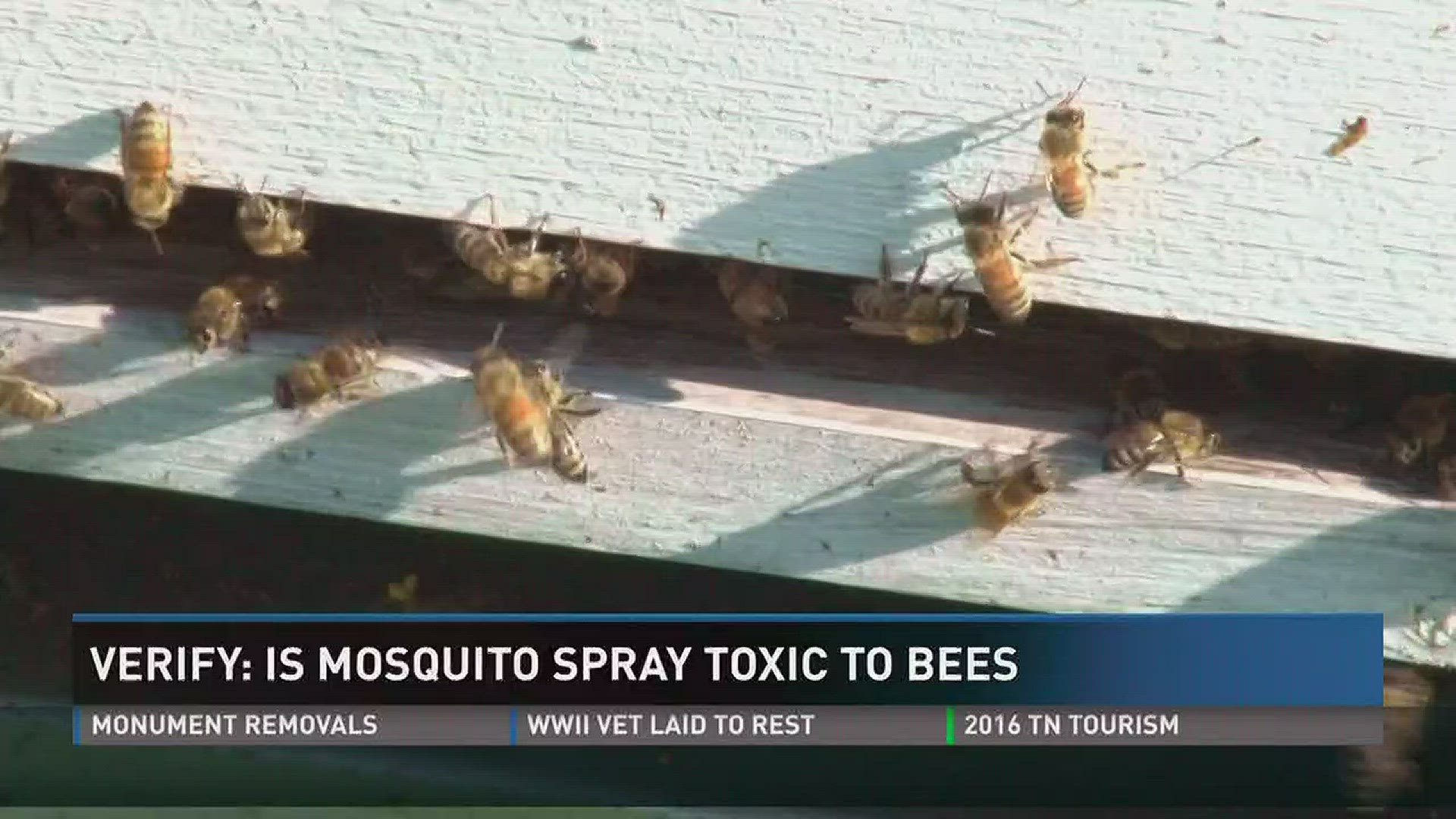The Knox County Health Department is spraying for mosquitoes Aug. 22 and Aug. 24 after it confirmed the presence of West Nile Virus in mosquitoes in six areas of Knox County.
After a viewer questioned the effectiveness of the spray, 10News sought to verify its effects.
Viewer Kyla Wolf Davis wrote in part on our Facebook page, "...the spray is killing everything but the mosquitos. It is killing the bees, and other pollinators."
A spokesperson for the Knox County Health Department said it uses the spray Biomist 30+30, and it is highly toxic to bees if directly exposed.
The health department only sprays at night between the hours of 9 p.m. and midnight when bees are more likely to be in their hives.
The spokesperson also said the health department keeps a list of registered beekeepers from the state and turns off the sprayer in those areas to minimize its impact since the bee population is extremely important.
Roger Easterday is a member of the Knox County Beekeepers Association. He lives in Knox County but moved his hives to Anderson County about a year ago because he said there are more food sources and less pesticides and herbicides than in the city.
Easterday tends to 11 hives filled with at least 650,000 bees. He's now a little less worried about sprays impacting his bees since they are further out in the country.
"When we hear that they're spraying for mosquitoes, we most certainly want to know where because that pesticide, if it gets on the bees, will kill them," Easterday said.
He also said that bees feed mouth-to-mouth and groom each other when they come in the hive, which could create a problem if one is sprayed outside the hive.
"Any bee that has that pesticide on it is going to get transferred to other bees and can potentially kill the whole hive if there's enough concentration of the poison on the bee," he added.
Easterday said he got into beekeeping because of his fascination of seeing how they work, but he also wants to continue to see the population thrive.
"Eighty-five percent of our food sources come from bees or have to be pollinated by bees,"Easterday said, "so it'd be kind of hard to maintain the amount of food we need to grow without them."
So we can verify that Biomist 30-30 is extremely toxic for bees, fish and other aquatic organisms if they come into direct contact with it, but we can also confirm the Knox County Health Department is aware of that and trying to prevent any damage to known bee hives.
The Knox County Health Department will spray the following areas Aug. 22:
Asheville Highway/Carter:
Carter Mill Subdivision; Knox County’s Carter Park; Strawberry Plains Pike from Asheville Highway to Carter School Road; Carter School Road from Strawberry Plains Pike to Asheville Highway; and Asheville Highway from Carter School Road to Strawberry Plains Pike will be treated Tuesday, Aug. 22, weather permitting. Follow-up spraying is scheduled for Tuesday, Sept. 5.
Fairmont Boulevard:
Mineral Springs Avenue from Walker Boulevard to Whittle Springs Road; Walker Boulevard from Mineral Springs Avenue to Powers Street; Montclair Avenue; Underwood Place; White Oak Lane; Valley View Drive from Whittle Springs Road to White Oak Lane; McCampbell Avenue; Upland Avenue; Tecoma Drive; Arbor Place; Maxwell Street; Emoriland Boulevard east of Kuhlman Street; Fairmont Boulevard from Kuhlman Street to Maxwell Street; Avondale from Whittle Springs to Maxwell Street; Boright Place; Boright Drive from Whittle Springs Road to Maxwell Street; McNutt Street; Brunswick Street; Whitney Place; Forestdale Avenue from Whittle Springs Road to Maxwell Street; Edgewood Avenue from Barton Street to Maxwell Street; Barton Street from Edgewood to Fairmont; Albert Avenue from Barton Street to Fairview Street; Nickerson Avenue from Barton Street to Bellevue Street; Fairview Street from Nickerson Avenue to Edgewood Avenue; Clearview Street; Orlando Street; Bellevue Street; Derieux Drive; Seymour Avenue; Sandra Avenue; Shaw Drive; Fontana Street; Fairwood Avenue; Powers Street; and Miami Street will be treated Tuesday, Aug. 22, weather permitting. Follow-up spraying is scheduled for Tuesday, Sept. 5.
Tower Drive:
Aurora Lane; Charlene Lane; Woodale Drive; Old Central Avenue Pike; Steeple Chase Apartment complex; Pratt Road; Tower Drive; Lawrence Road; Caron Drive; Sierra Road; Chesswood Drive; Woodleaf Drive; Sanford Road; Lutie Road; Oakcrest Road; Tillman Road; Rowan Road south to Henrietta Drive; Henrietta Drive east to Willoway Drive; Delapp Drive; and Griffins Gate Lane will be treated Tuesday, Aug. 22, weather permitting. Follow-up spraying is scheduled for Tuesday, Sept. 5.
The following areas will be sprayed Aug. 24:
Choto/Heron’s Point:
Subdivisions Amber Woods, Bayview West, Choto Farms, Heron’s Point, Livery, Mallard Bay, Tanglewood, Walnut Grove and the Woods at Montgomery Cove will be treated Thursday, Aug. 24, weather permitting. Follow-up spraying is scheduled for Thursday, Sept. 7.
Gulf Park/Venice Road:
Dutchtown Road from Christian Academy of Knoxville (CAK) to Blessed Way including Manis Lane and the area around CAK; Embarcadero Drive; Cortez Drive; Tallahassee Drive; Sanders Road from Dutchtown Road to Venice Road; Venice Road; Ethans Glen Drive; Tampa Road; Suwannee Road; Gulf Park Drive; Galveston Road; Naples Road; Sarasota Drive; Mobile Drive; Briarwood Drive; Laurel Hill Road; and the areas around Cedar Bluff Primary and Cedar Bluff Middle School will be treated Thursday, Aug. 24, weather permitting. Follow-up spraying is scheduled for Thursday, Sept. 7.
Karns/Knox County Sports Park:
Hackworth Road; Boles Road; West Emory Road from Henderson Road to Boles Road; Old Cobbs Ferry Road; Karns Valley Drive; Walkers Gate Subdivision; Brookhaven Subdivision; Bluebell Lane; West Meadow Subdivision; Garrison Road from Byington-Beaver Ridge Road to Byington-Solway Road; and Boomerang Lane will be treated Thursday, Aug. 24, weather permitting. Follow-up spraying is scheduled for Thursday, Sept. 7.
People and pets are asked to stay inside between 9 p.m. and midnight while crews complete the spraying.

